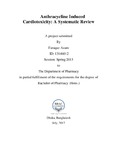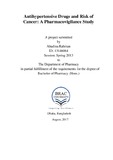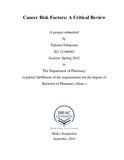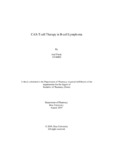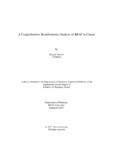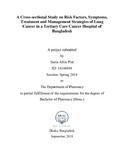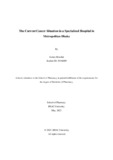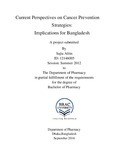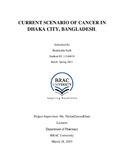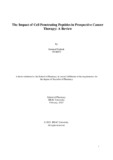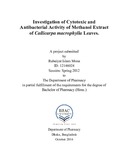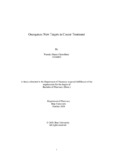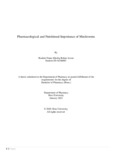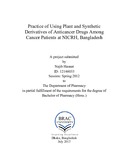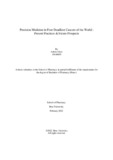Browsing School of Pharmacy (PHR) by Subject "Cancer"
Now showing items 1-20 of 35
-
Anthracycline induced cardiotoxicity: A systematic review
(BRAC University, 2017-07)Cancer cure currently involves a combination of integrative treatments; chemotherapy, radiotherapy, and surgery to extend life and deliver sustainability to the survivors. Among all the classes of chemotherapeutics, ... -
Antihypertensive drugs and risk of cancer: A pharmacovigilance study
(BRAC University, 2017-08)Antihypertensive drugs are widely used for the treatment of hypertension, heart failure and, recently, for cardiovascular risk reduction. Experimental studies implicate antihypertensive drugs in the regulation of cell ... -
Biosimilar in lymphoma treatment
(Brac University, 2021-04)We are living in an era where the number of ageing population is increasing, as well as the demand for treating chronic conditions like cancer, cardiovascular disease, diabetes, etc. Considering the different types of ... -
Cancer risk factors: a critical review
(BRAC Univeristy, 2016-09)The global burden of cancer cases has been estimated to rise from 14.1 million to 23.6 million between 2012 and 2030. Many genetic and environmental risk factors are likely to induce the incidence and mortality rate and ... -
CAR-T cell Therapy in B-cell Lymphoma
(Brac University, 2019-08)B-cell lymphoma continues to be difficult to treat, with insignificant advances seen in more than two decades despite improvements in initial treatment strategies across its subtypes. Developing new targeted therapies which ... -
A comprehensive bioinformatics analysis of BRAF in cancer
(Brac University, 2021-09)BRAF is one of the most vital serine/ threonine-protein kinase proto-oncogenes that performs a crucial role in cellular proliferation, growth, signaling and secretion. By deregulation of this gene can lead to terrible ... -
A cross-sectional study on risk factors, symptoms, treatment and management strategies of lung cancer in a tertiary care cancer hospital of Bangladesh
(BRAC University, 2018-09)Lung cancer is the most common clinical problem of Bangladesh. Lung cancer is the uncontrolled, abnormal growth of cells that starts off in one or both lungs, usually in the air passages of cell lining. This study has ... -
The current cancer situation in metropolitan Dhaka
(Brac University, 2023-05)Dhaka, the country's most populous metropolis, is also one of the most polluted because of its heavy reliance on industry and the resulting release of harmful emissions and carcinogens into the air. The data collected from ... -
Current perspectives on cancer prevention strategies: implications for Bangladesh
(BRAC Univeristy, 2016-09)Cancer is a very complex disease. Many cancers remain incurable. However, risk of cancer can be reduced through appropriate measures. Good lifestyle choices like having a healthy diet, regular physical activity,reducing ... -
Current scenario of Cancer in Dhaka City, Bangladesh
(BRAC University, 2015-03-28)Bangladesh is a densely populated country with a population of almost 170 million. Along with the increasing global cancer burden, the incidence of cancer in Bangladesh is also increasing at an alarming rate. According to ... -
Epigenetic therapy in cancer
(Brac University, 2017-07)Epigenetic therapy has received much attention in the field of oncology in recent years. A growing recognition of the influence of epigenetic modifications in tumorigenesis and the clinical success of several ... -
Exploring the use of Ingenol Mebutate to prevent non-melanoma skin cancer: A review
(Brac University, 2022-09)Globally, the incidence of non-melanoma skin cancer is increasing rapidly. Actinic keratosis (AK) is a type of sun damaged skin disease with a greater probability of turning into squamous cell cancer. However it is ... -
The impact of cell penetrating peptides in prospective cancer therapy: a review
(Brac University, 2023-02)Cell penetrating peptides have been identified as a viable tool for therapeutic use in the era of biomedicines and specialized carrier systems. Similar to other therapeutic peptides, peptide stability- the bottleneck for ... -
Investigation of cytotoxic and antibacterial activity of methanol extract of callicarpa macrophylla leaves
(BRAC Univeristy, 2016-10)Callicarpa macrophylla (family: Verbenaceae) has been commonly used in traditional medicine for a wide range of ailments related to the circulatory, digestive, endocrine, respiratory and skeletal systems as well as to ... -
Oncogenes: new targets in cancer treatment
(Brac University, 2019-10)In the recent years, progression in cancer genetics and biology has shifted the paradigm for cancer drug development and design. Greater emphasis is given for the development of a specific, non-toxic and molecule based ... -
Pharmacological and nutritional importance of Mushrooms
(Brac University, 2021-01)Mushrooms are micro fungi cultivated and consumed by peoples of different countries across the world. Even though they are quite common, but their significant importance is not that much known to everyone. Mushrooms have ... -
Point-of care diagnostic devices in cancer detection
(Brac University, 2022-04)Cancer is the leading cause of mortality in the world, claiming the lives of one in every seven people. It is commonly known that early detection and screening are critical for boosting the chances of recovery. Patients, ... -
Potential of nanoparticles as a topical drug delivery system for skin cancer: a review
(Brac University, 2022-07)Skin cancer is among the most widespread and challenging forms of cancer, with high death rates globally, the seventeenth most prevalent cancer in the world. Conventional treatment options for skin cancer, including surgical ... -
Practice of using plant and synthetic derivatives of anticancer drugs among cancer patients at NICRH, Bangladesh
(BRAC Univeristy, 2017-07)Myriad lines of therapy are used to treat cancer around the world. The study was conducted on the patients of National Institute of Cancer Research (NICRH) to estimate which type of anticancer drugs are mostly being used ... -
Precision medicine in four deadliest Cancers of the world : present practices & future prospects
(Brac University, 2022-02)Cancer is a very personalized disease which is why conventional oncology treatment following the ‘one size fits all’ method is unable to cure all patients effectively and for this, cancer remains one of the leading causes ...

